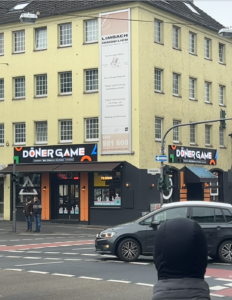Döner in Bonn
Döner in Bonn
As a college student I am constantly looking for affordable meals that not only taste good but also are filling. In the states the options that check all these boxes are nearly all limited to fast-food, however I have found this is not the case in Bonn, Germany. One of the first things I noticed when I started to explore this new city besides the incredible pedestrian infrastructure and architecture filled with character was the availability of this food called döner. Döner is basically shawarma or kebab. On every street and around every corner you can find a small döner place, always with the door propped open letting the smell of the slow cooked beef and chicken into the streets. Döner is cheap, delicious, and so widely available in Bonn, but how did it become so prevalent, and what role does it play in the larger culture of Bonn, Germany?

Origins
The origins of Döner can be traced back to Turkey. Dishes similar to döner have been observed there as early as the 1800’s. It originated as slow cooked meat on a horizontal rotisserie, then later with the invention of the shish kebab we saw the vertical skewer being used. The cuisine made its way into Germany in the 1970’s, while there is no concrete evidence, it is thought that the first döner was opened in Berlin. Throughout the next few decades döner spread rapidly, first to the East and then through Western Germany. One of the main reasons why it became so popular was because it was incredibly cheap as it still is today. From Germany it spread to other European countries such as Switzerland, Liechtenstein, and Austria.
Cultural Impact
When you think of German cuisine you may think of bratwurst, currywurst, or schnitzel, however, döner is more widely consumed than any of those other dishes. The popularity of döner, as döner is a foreign dish, has a direct relationship with immigration to Germany. Post-War Germany has an incredibly complicated history with immigration, with it to this day being a widely discussed topic among politicians and the upcoming election here in Germany. To give a condensed version of the history, in the 1950’s and 1960’s Germany needed more workers and many people immigrated to Germany. The German people and government were under the assumption that after this period of work that they would go back to their countries, but they stayed. Because of the low-income housing situation for these workers, assimilation and integration was incredibly difficult. As döner became an integral part of German cuisine, these immigrants became an integral part of German society, with a fifth of the German population having immigrant backgrounds.
At first glance, many people (including myself) wouldn’t think of döner as anything more than a popular, cheap lunch option. The history and culture that döner brings, and important topics that it is directly related to are not things that people would think to research. Knowing this now, you can start to think about your own community, and how similar aspects are interwoven into culture and history.
– Ryan D
sources
